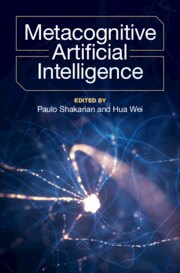Book contents
- Frontmatter
- Contents
- Contributors
- Acknowledgments
- Part I Introduction
- Part II Taxonomy of Metacognitive Approaches
- Part III Neuro-Symbolic Models in AI
- Part IV Metacognition with LLMS
- Part V Metacognition in Learning Agents
- Part VI Assured Machine Learning in High-Stakes Domains
- Part VII Metacognition as a Solution to Handle Failure
- Part VIII Applications of Metacognitive AI
- 15 Robust and Compositional Concept Grounding for Image Generative AI
- 16 mLINK: Machine Learning Integration with Network and Knowledge
15 - Robust and Compositional Concept Grounding for Image Generative AI
from Part VIII - Applications of Metacognitive AI
Published online by Cambridge University Press: 08 September 2025
- Frontmatter
- Contents
- Contributors
- Acknowledgments
- Part I Introduction
- Part II Taxonomy of Metacognitive Approaches
- Part III Neuro-Symbolic Models in AI
- Part IV Metacognition with LLMS
- Part V Metacognition in Learning Agents
- Part VI Assured Machine Learning in High-Stakes Domains
- Part VII Metacognition as a Solution to Handle Failure
- Part VIII Applications of Metacognitive AI
- 15 Robust and Compositional Concept Grounding for Image Generative AI
- 16 mLINK: Machine Learning Integration with Network and Knowledge
Summary
Text-to-image (T2I) diffusion models require large-scale training data to achieve such good performance. Still, they seem to lack a common understanding of semantics such as spatial composition, and spurious correlations raising ethical concerns. Data and model size do not matter in learning better semantics; instead, they seem to hurt the model. Recent works have shown the few-shot concept learning abilities of T2I models on simple concepts like cat or dog. Following the line of research, we introduce in this chapter utilizing Concept Algebra for learning new concepts in a resource-efficient way.
To do that, we introduce three works focusing on concept learning to show its effectiveness: (1) Create a benchmark for large-scale evaluations of concept learning methodologies, (2) Reduce ethical biases via Concept Algebra via few-shot concept learning, and (3) Learn spatial relationships via few-shot concept adaptation. Through this research, we describe the efforts to create few-shot synthetic data that is both robust and reduces biases present in various forms.
Information
- Type
- Chapter
- Information
- Metacognitive Artificial Intelligence , pp. 259 - 263Publisher: Cambridge University PressPrint publication year: 2025
